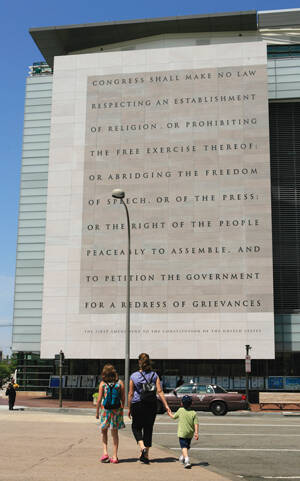A new Health and Human Services mandate issued under the Affordable Care Act for women’s preventive care goes into effect in August 2012. That mandate requires that new employer-sponsored health insurance plans include, without deductibles or co-pays, all F.D.A. approved methods of contraception. Among these are procedures and drugs that are objectionable to Catholic moral teaching.
The H.H.S. has offered a narrow religious exemption that frees religious employers like dioceses and parishes from the mandate. But institutions that are not exempt from the new guidelines because their employees and the people they serve come from different faiths or no faith at all—primarily Catholic colleges and universities and health and social service providers—have until August 2013 to figure out how to adapt their employee benefits to the mandate. Obama administration officials have indicated that they consider dialogue regarding the exemption language over.
The divide between the administration and the U.S. Conference of Catholic Bishops in this renewed culture war is deep. They cannot even agree on terms. The so-called morning after drugs, Plan B and ella, are among the prescription options that will be required under the new guidelines. The bishops say they are abortifacients; the F.D.A. and the drug makers say they are not. Both sides are right according to their privileged definitions.
Ella and Plan B work in much the same manner, primarily by delaying ovulation. According to the F.D.A., Plan B may also prevent fertilization. If fertilization does occur, both drugs may prevent a fertilized egg from attaching to the womb. According to the F.D.A., these “morning after” pills cannot be described as abortifacients because no pregnancy occurs. But according to Ethical and Religious Directives for Catholic Health Care Services, every procedure “whose sole immediate effect is the termination of pregnancy before viability is an abortion, which, in its moral context, includes the interval between conception and implantation of the embryo.”
The dispute also revolves around conflicting interpretations of religious liberty. The president insists that the new guidelines respect the traditional primacy of religious liberty, since individual employees of Catholic institutions remain free to use or not use contraception based on their religious or moral beliefs.
He is supported in that interpretation by the A.C.L.U. “This rule respects religious liberty while preventing religiously affiliated organizations from using religion as an excuse to discriminate and deny services to others,” writes Sarah Lipton-Lubet of the A.C.L.U. “Organizations that operate in the public sphere should play by public rules. That’s not a ‘war’ on religion; that’s the Constitution.”
The bishops argue that requiring religious institutions to pay for health care that includes procedures or prescriptions that violate founders’ beliefs is a fundamental violation of both institutional and—since all participants in a plan share costs—individual conscience. “The issue,” writes Bishop David A. Zubik of the Diocese of Pittsburgh, “is the right of the church to be able to live its beliefs without contrary beliefs and practices being imposed by departments of the federal government.”
A final major concern of the bishops is the precedent set by the administration’s assumption of a defining authority over religiously affiliated entities simply because they are engaged in providing civic services, like education or health care. Some worry that after “secularization” in this manner by the state, it will not be long before other government mandates will be applied to religious institutions or that in retreat from such mandates, religious entities will be driven from the public sphere altogether.








